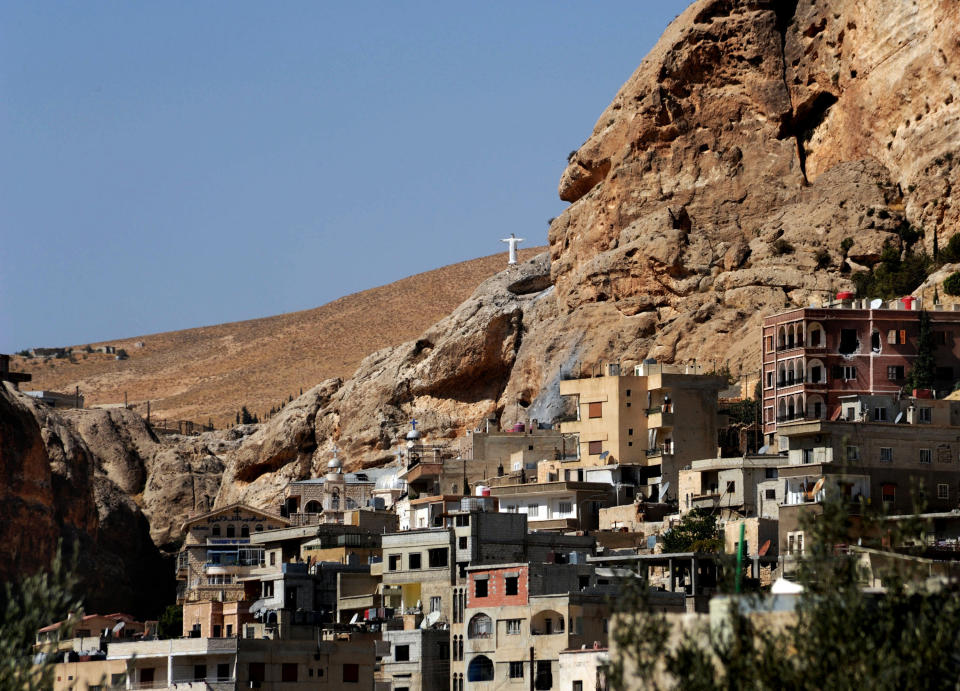Syrian forces try seize rebel-held areas of Homs

DAMASCUS, Syria (AP) — Syrian forces tried to seize rebel-held areas of Homs on Tuesday, with fighters weakened by defections and cut supply lines, in some of the fiercest fighting in the central city for months, activists said.
Homs is the last chief stronghold for rebels in central Syria, and the fight to take it underscores how emboldened Syrian forces have methodically taken back opposition-held areas, bolstered by fighters from the Lebanese Shiite group Hezbollah.
Forces loyal to Syrian President Bashar Assad used heavy machine gun fire, tank fire and aircraft shelling to pound rebels holed up in the old city of Homs, said an activist who uses the name Abu Bilal. The assault began five days ago, but Tuesday was the heaviest day of fighting in months, he said.
"They are trying to attack us from a series of axis points," he said over Skype as heavy shelling could be heard in the background.
Rebels fired mortar shells into government-controlled neighborhoods, killing 15-year-old Tarek Ghrair, a player for the country's national youth football team, according to the Syrian Football Association's president.
Other rebel-fired mortar shells killed a woman and child, reported the Britain-based Syrian Observatory for Human Rights.
Another six rebels were killed, said Abu Bilal and the Observatory.
The fighting came as rebels were badly weakened by a yearlong blockade preventing food and medicines from entering, causing fighters to surrender. It was unclear how many turned themselves in, although Abu Bilal estimated at least 1,000 men.
"Their spirits weakened. They wanted cigarettes and water," he said.
The U.N. also oversaw the evacuation of hundreds of civilians earlier this year who had effectively acted as a shield for rebels.
They were also weakened after Assad-loyal forces seized their border strongholds near northern Lebanon in early March, cutting their supply route.
The fight for Homs came a day after pro-government fighters swept through some of the last remaining opposition strongholds in the countryside north of Damascus, strengthening its grip on the border with Lebanon and severing rebel supply routes across the frontier.
On Tuesday, another town in the area, Assal al-Ward, fell into government hands, state TV said.
Still, rebels continued firing mortars into Damascus.
Two mortar rounds landed near schools in predominantly Christian districts of the Syrian capital Tuesday, killing one child and wounding 41 other people, state media said.
Syria's official news agency said one of the shells struck a school in the Bab Touma neighborhood, killing one child and wounding 36 others. Another mortar round exploded near the Mar Elias Church in the Dweilaa district, wounding five people.
Opposition fighters say they aren't specifically targeting Damascus' large Christian minority. Still, because the mortars cannot be precisely targeted, their victims have often been civilians, including children in schools.
In the northern Syrian city of Aleppo, at least one child was also killed in government shelling of rebel-held areas, said activists.
In Saudi Arabia, the kingdom's foreign minister, Saud Al-Faisal, called on the international community to take "firm action" against the Syrian government for its alleged use of poisonous gas last week in the rebel-held village of Kafr Zeita in Hama province.
Activists say Syrian government aircraft dropped explosive-laden barrels that also contained chlorine gas on the village on Friday and Saturday, killing two people and wounding dozens. Syrian state TV blamed the al-Qaida-affiliated Nusra Front for the attack.
U.S. officials have said the claims of poison gas are so far unsubstantiated, but that Washington was trying to establish what occurred.
Online videos posted by rebel activists showed pale-faced men, women and children gasping for breath at what appeared to be a field hospital. They suggested an affliction by some kind of poison.
The videos resembled — albeit on a much smaller scale — of an Aug. 21 chemical attack near Damascus that killed hundreds of people.
Speaking in the Saudi capital, Al-Faisal said that "these continuing abuses by the regime in Damascus are now requiring the international community to take firm action against the regime's continued defiance."
Saudi Arabia has championed rebel efforts to overthrow Assad's rule, and has been exasperated with Washington's cautious approach to the conflict.
__
Hadid reported from Beirut. Associated Press writer Barbara Surk in Beirut, and Aya Batrawi in Dubai contributed to this report.

 Yahoo News
Yahoo News 